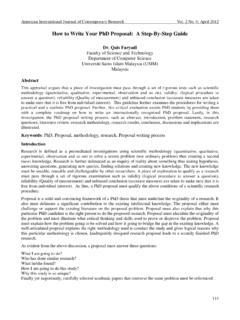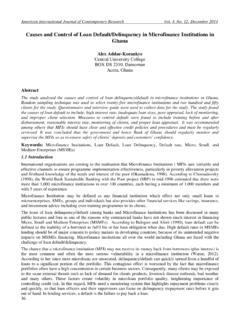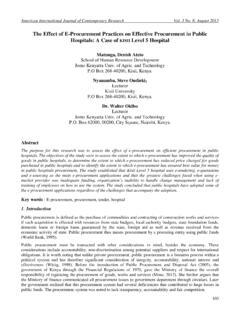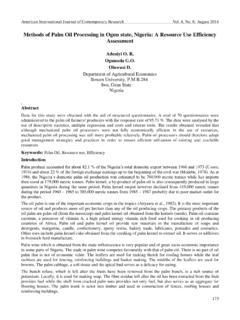Transcription of Theoretical Constructs, Concepts, and Applications
1 American International Journal of Contemporary Research Vol. 2 No. 9; September 2012 89 Theoretical Constructs, Concepts, and Applications Daniel Udo-Akang Business Administration Candidate Northcentral University, Arizona & Adjunct Faculty American Military University 111 West Congress Street, Charles Town, WV 25414, USA. Abstract This paper discusses the importance of theory to research and includes a discussion of how theory is conceptualized. Researchers have debated the definition of theory for many years, with many theorists using typologies and classifications systems to describe the types of theory, in the context of purpose, functions, boundaries, and that is driven by research is directly relevant to practice and beneficial to any field of study.
2 The systematic nature of theory is to provide an explanation of a problem, to describe the distinguishing innovative features of a phenomenon, and to provide predictive utility. Research without theory has no foundation; likewise, theory depends on research to provide proof of the theories correctness. Keywords: Theory, Constructs, Concepts, Practice, Research, Neo-institutional, Grounded Theory, Substantive Theory, Worldviews Introduction The importance of theory in research cannot be underestimated. In addition, research requires a sound Theoretical basis and strong (1998) provided three reasons why theory is important for research: (a) it provides a framework for analysis, (b) it provides an efficient method for field development, and (c) it provides a clear explanation for the pragmatic , the definition of what constitutes a theory is debated by researchers (Gelso, 2006; Harlow, 2009; Henderikus, 2007).
3 Many researchers and theorists use typologies and classifications systems to describe the types of theory, in the context of purpose, functions, boundaries, and goals (Gay & Weaver, 2011).Although differing opinions and conflicting points of viewconstitute a major Theoretical controversy, Gelso (2006) defined theory using eight constructs: (a) descriptive ability, (b) explanatory power, (c) heuristic value, (d) testability, (e) integration, (f) parsimony, (g) clarity, (h) comprehensiveness, and (i) constructs are based on the fact that theory generates research and research generates and refines theory (Gelso, 2006).
4 Harlow (2009) argued that theory does not have a fixed and universal meaning, but considering the competing research paradigms, theory might suggest a determining law, or system of laws, as in the natural sciences, or a construct or set of constructs for ordering and understanding phenomena. Theory Definition and Constructs Although there are differing opinions as to what constitute a theory, a comparison and contrast of the diversity of opinions on what constitute the virtues of a good theory is important. Wacker (1998) stated, Operationalization of the definition of theory should directly be tied to the necessary components of theory (p.)
5 363). According to Walker (1998), theory is composed of four components: (a) definitions, (b) a domain of applicability, (c) a set of relationships of variables, and (d) specific predictions or factual (1968)argued that a good theory must be stated explicitly with the aim of formulating a logically consistent and mutually interdependent body of knowledge. Rychlak(1968) suggested the four functions of a theory are (a) descriptive, (b) delimiting, (c) generative, and (d) integrative. Based on Rychlak suggestions, Gelso (2006) argued that for a theory to have scientific value, it must go beyond the simple propositional level.
6 Centre for Promoting Ideas, USA 90 Most importantly, theories should serve to describe and explain a phenomenon effectively, should place a limit on what might be examined, and should be highly generative to heuristically stimulate further investigation (Gelso, 2006). Although a good theory should have an integrative function to be able to consolidate disparate or contradictory propositions and constructs for a high degree of consistency, having an ingredient of parsimony thatincludes only the constructs and ideas that are necessary to better explain the phenomena under investigationis important (Gelso, 2006).
7 However, despite these definitions and constructs, much discussion has occurred among theorists and researchers based on their scholarly approach to theory from different and competing worldviews and paradigms (Dimaggio & Powell, 1983; Eisenhardt, 1989; Eisenhardt&Graebner, 2007; Gay & Weaver, 2011; Glaser & Strauss, 1967;Harlow, 2009;Henderikus, 2007; Suddaby, 2006). Theory and Competing Worldviews Due to intellectual curiosity, competing conceptions, conflicting assumptions, and astonishing variety of approaches to theory based on individual worldviews, there are several taxonomies associated with theory.
8 According to Gay and Weaver (2011), the research assumptions and goals tend to detect which approach to theory researchers utilize. Lynham (2002) defined the conceptual development of theory as an informed conceptual framework that provides an initial understanding and explanation of the nature and dynamics of the issue, problem, or phenomenon that is the focus of the theory (p. 231). According to DiMaggio (1995), There are at least three views of what a theory should be: (a) theory as covering laws, (b) theory as enlightenment, and (c) theory as narrative (p.)
9 391).In addition, Gelso (2006) discussed three critical points as central to theory (a) idea generation, (b) hypothesis generation, and (c) interpretation of (2002) argued that due to an inherently generic nature of theory, different methods of theory building require different theory-building research processes. Despite these numerous and competing views, it is important to examine the intersection betweentheory and related concepts, paradigms, model, and hypotheses to be able to have an explicit view on the nature and types of theory.
10 Rychlak (1968) and Kerlinger (1986) also held similar views and provided a description of theory as a series of two or more interrelated constructs, abstractions, concepts, variables, definition, and propositions, which have been hypothesized with a systematic view of phenomena, for the purpose of explaining and predicting the phenomena. According to Celso (2006), theories contain Theoretical propositions, and hypotheses are derived from these propositions. While Sutton and Stow (1995) defined hypotheses as crucial bridges between theory and data, Cozby (2009) stated that propositions are statements that express the relationship of two or more concepts.









